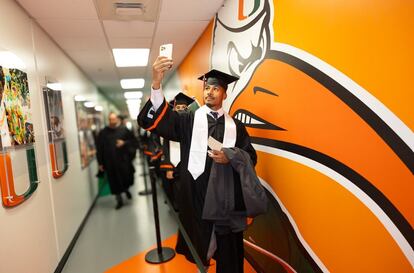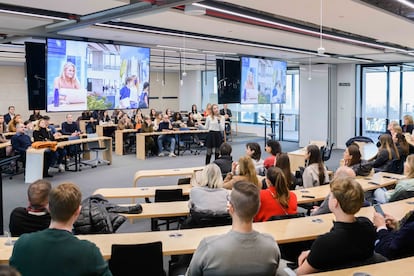AI is transforming student selection in university admissions
Colleges are using artificial intelligence to screen candidates, conduct admission interviews and help freshmen choose a major

No university administrator anywhere would consider entrusting the entire admission process to a computer. However, many of them view artificial intelligence (AI) as a valuable tool for initial screenings of the vast pool of annual applicants. It’s also a rising trend in corporate recruiting. According to a recent Infojobs report, AI was used by 5% of Spanish companies for hiring in 2023, with plans to extend this to another 11% soon. Ultimately, human judgment prevails in the final decision-making process. While Spanish public universities do not currently use AI for this purpose, private universities may embrace it in the future. The application of AI in student selection was a topic of discussion among university officials at the Reinventing Higher Education conference co-hosted by Spain’s IE University and the University of Miami in Florida.
“The top areas where AI can bring huge benefits are healthcare and education. So, I think it’s a mistake to try to avoid or ban it,” said University of Miami President Julio Frenk, who has launched a pilot program in admissions. “We review 50,000 applications every year and select around 8,000 to 9,000 students. If advanced language models can enhance selection, admission committees can make better-informed, fairer decisions for students.”
The University of Miami requires candidates to submit their grades and write an essay about their life experiences. “We seek traits to spot individuals who’ve conquered challenges. While we still need human judgment, AI can efficiently sift through huge applicant pools.” Frenk firmly denies their approach is elitist. “It’s pointless to accept someone only for them to leave after a year because they’re overwhelmed by the workload. This approach helps us focus our scholarships more effectively.”
Universities looking interested in applying AI in admissions processes need to clearly define the essential skills and competencies they require in students. By integrating an AI platform and training a customized algorithm, they can identify candidates who meet their criteria, while reducing individual biases. AI can also schedule and conduct interviews, keeping candidates informed throughout the admissions process. People must monitor the process closely and analyze student grade data for insights on trends and areas for improvement.
David Garza, rector and executive president of the prestigious Monterrey Institute of Technology (TEC) in Mexico, says his university has not considered using AI in admissions because their priority has been on applying it in teaching. TEC created its own bot to answer practical questions from university students and help teachers plan and prepare classes. Garza says he’s in favor of AI in admissions because “it can help us synthesize information. However, the final decision in a sensitive process like this one should remain in the hands of committees.” TEC requires an admission exam, a summary of academic achievements and an essay. If the application’s authorship is in doubt, a video is requested. TEC annually admits 6,000 students who go through a special high-school prep course, and another 6,000 from a pool of 18,000 applicants.

Many universities in Singapore, a global powerhouse in AI research, use AI in admissions processes. But not Singapore Management University. It’s vice-rector for research, Archan Misra, attended the conference in Miami and told us that if the university decides to use it in the future, it would implement “a kind of feedback loop,” so that students who exhibited the same pattern of success would be consistently selected. Misra, a computer science professor, offered another useful application of language models. “We’re considering AI to suggest interview questions for students, but the interviewer has the final call on which questions to ask. It’s a tool, not an AI-based student ranking system.”
At IE University, with campuses in Madrid and Segovia, the admission process is quite complex since it attracts students from 160 countries. They have a unique approach to using AI in admissions. University President Santiago Íñiguez described their development of an AI application to assist students in selecting a major. “We have two applications that provide uniform answers to the students’ questions and help them identify the most suitable major.” Íñiguez believes these types of applications are very helpful as they store and draw on all the information from previous candidate interviews.
IE University “no longer gives as much weight in admissions to essays and motivational letters,” said Íñiguez. Letters of recommendation have also dropped in importance. The AI used in admissions weighs an applicant’s complete academic record, admission test results and interview (to assess maturity). IE University accepts 9% of its applicants.
Minerva University president and founder Ben Nelson, which claims to be more selective than Harvard with a 1% admission rate, is concerned about AI in admissions leading to “false positives” and “false negatives.” He advises rigorous testing before implementation. “It can be useful, but you have to be very confident about it.” His San Francisco-based university uses “many of its own automated formulas” to evaluate the applicants’ mathematics and language achievements, and the rest of the process is “manual.” About 25,000 students apply to Minerva every year.
Sign up for our weekly newsletter to get more English-language news coverage from EL PAÍS USA Edition
Tu suscripción se está usando en otro dispositivo
¿Quieres añadir otro usuario a tu suscripción?
Si continúas leyendo en este dispositivo, no se podrá leer en el otro.
FlechaTu suscripción se está usando en otro dispositivo y solo puedes acceder a EL PAÍS desde un dispositivo a la vez.
Si quieres compartir tu cuenta, cambia tu suscripción a la modalidad Premium, así podrás añadir otro usuario. Cada uno accederá con su propia cuenta de email, lo que os permitirá personalizar vuestra experiencia en EL PAÍS.
¿Tienes una suscripción de empresa? Accede aquí para contratar más cuentas.
En el caso de no saber quién está usando tu cuenta, te recomendamos cambiar tu contraseña aquí.
Si decides continuar compartiendo tu cuenta, este mensaje se mostrará en tu dispositivo y en el de la otra persona que está usando tu cuenta de forma indefinida, afectando a tu experiencia de lectura. Puedes consultar aquí los términos y condiciones de la suscripción digital.









































